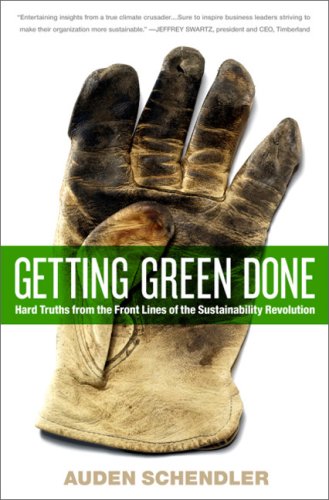Climate Technology
All Stories
-
U.S. government paying industry to pollute
Chris Hayes has a blockbuster scoop up on The Nation: “Pulp Nonfiction,” about how the U.S. government will pay the paper industry up to $8 billion this year to emit more carbon dioxide. Yeah, you read that right. The horror begins, as it so often does, with well-meaning efforts by Congress to encourage biofuels. The […]
-
Myth: Pricing carbon will destroy the economy
Legislators from dirty-energy producing states, energy-intensive business lobbies, and conservative think tanks struggle to outdo one another with apocalyptic predictions about the effects of mandatory greenhouse gas emission reductions. See, for example, the Chamber of Commerce’s video showing children shivering in the cold (really). As climate legislation evolves this year, the rhetoric is ramping up […]
-
Does carbon-eating cement deserve the hype?
I am trying to identify the plausible CO2-mitigation strategies that are scalable — that can comprise at least a half a wedge (see “How the world can stabilize at 350 to 450 ppm: The full global warming solution). So when a new process gets this much hype — as in Scientific American’s, “Cement from CO2: […]
-
Waxman bill threatens children and elderly, says very concerned power industry
Reactions to the Waxman energy legislation are going to be pouring in over the coming days and weeks. On an early read, environmentalists are enthusiastic. But who is looking out for society’s most vulnerable? Power companies, of course! Says Scott Segal, chairman of the Electric Reliability Coordinating Council: … the bill’s silence on a method […]
-
‘Getting Green Done’ speaks hard truths about sustainable business
Corporate sustainability guru Auden Schendler lays out the problem with corporate sustainability gurus in his recent Getting Green Done: Hard Truths from the Front Lines of the Sustainability Revolution. In doing so, he pretty much dares the nation’s copy editors to title their reviews with the decade’s most played-out headline: “It’s Not Easy Being Green.” […]
-
Corporate sustainability guru visits Seattle
Corporate sustainability guru Auden Schendler lays out the problem with corporate sustainability gurus in his recent book "Getting Green Done."
-
Closing the door on building new coal-fired power plants in America
This post was originally published at earthpolicy.org. —– Community opposition, legal challenges, and financial uncertainty over future carbon costs are prompting companies to rethink their plans for coal. Since the beginning of 2007, 95 proposed coal-fired power plants have been canceled or postponed in the United States — 59 in 2007, 24 in 2008, and […]
-
U.S. corporation poisoning Africa’s lions
60 Minutes had an extraordinary piece by Bob Simon this weekend on how U.S. poison manufacturer FMC is exporting Furadan (banned in Europe and strictly controlled in the United States) to Kenya, where it’s being used to poison lions, leading to an 85 percent drop in their population: [vodpod id=Video.16183146&w=425&h=350&fv=link%3Dhttp%253A%252F%252Fwww%252Ecbsnews%252Ecom%252Fvideo%252Fwatch%252F%253Fid%253D4901291n%26amp%3Bpartner%3Dnews%26amp%3Bvert%3DNews%26amp%3BautoPlayVid%3Dfalse%26amp%3BreleaseURL%3Dhttp%3A%2F%2Frelease.theplatform.com%2Fcontent.select%3Fpid%3Dc12M06gnxzXckItEof_v7Rceko3063jr%26amp%3Bname%3DcbsPlayer%26amp%3Ballowscriptaccess%3D] Call FMC at 215-299-6000 to […]
-
Pepsi makes good choices, or at least good PR hires
Dudes, what’s up with Pepsi? In the last few weeks the company has released at least three splashy sustainability stories touting its: testing of green vending machines in D.C. (30 out of 4-5 million, but hey) introduction of Eco-Fina, an Aquafina bottle that uses 50 percent less plastic (still plastic and still bottled water, but […]
-
NYT’s Tom Friedman updates the global warming threat and spells out the solution
The NYT columnist Tom Friedman has another terrific global warming piece this past weekend, “Mother Nature’s Dow.” He is the only major national columnist or reporter consistently warning the public of what science now tells us is likely result of continuing on our current greenhouse gas emissions path — unmitigated unconscionable catastrophe. And he is […]


